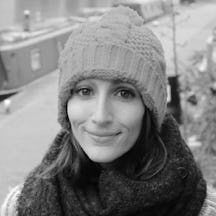As part of our Sharing Nature project, over the past fortnight we asked you to share your photos on the theme HEALTH, and respond to other people’s submissions. You decided Carole Tyrrell’s contribution was most meaningful.
Whenever I see a rainbow it lifts my spirits and makes me feel part of something much larger than myself. Nature inspires my curiosity and, as a Citizen Scientist making nature recordings for various organisations, it gives me a reason to get out and about. It takes me out of myself and my problems, whether it be finding wildflowers and Cinnabar caterpillars on Woolwich Common, or damselflies laying eggs in a Garden of Remembrance pool. But a rainbow always amazes me.
For Carole, the natural world stimulates body and mind, and promotes good physical and mental health. It’s a place to be out and about, learning new things, and it’s an uplifting source of perspective, a place of wonder and escape. The rainbow is a beautiful symbol of all that.
The idea that nature is good for us has been around for a while, and fresh air and exercise have long been seen as a kind of preventative medicine, as well as prescribed to soothe a variety of ills. That nature is good for our mental health and wellbeing has gained increasing traction of late. A report published by Natural England last year found that taking part in nature-based activities can reduce anxiety, stress and depression, while the RSPB and Wildlife Trusts are campaigning for a Nature and Wellbeing Act, which puts “nature at the heart of how decisions are made about health, housing and other development, education, economic growth, flood resilience and every community”.

A beautiful rainbow arches over a Beckenham semi.
The idea that human happiness is connected to the wider, natural world, that we possess an innate urge to affiliate with other forms of life, is not a new one. E.O. Wilson wrote about it beautifully, and at length, in his 1984 book Biophilia, but it’s been around much longer than that. As Florence Williams explains in The Nature Fix (a book you’ll find in our library), poets and philosophers have been extolling the benefits of being at one with nature for centuries, and scientists today are collecting hard evidence that demonstrates how and why that’s the case. Williams’ book trailer sums it up neatly, advising us all to “go outside, go often”.
Our relationship with nature is as practical as it is spiritual. Healthy soils, clean water and air, thriving plant and animal life: these are the keys to life as we know it. Nature is our source of food, fuel, fibre, and, of course, medicine. According to Forests, Trees and Human Health (another book you’ll find in our library), the use of medicinal plants is common to all civilisations. It explains that over 80 per cent of the world’s population rely on plant-derived medicine, and as many of 50 per cent of prescription drugs are based on a molecule that occurs naturally in plants. While industrialised countries pretty much abandoned the use of medicinal plants through the twentieth century, Western pharmaceutical companies have since revived their interest in traditional knowledge in pursuit of new drugs. The book reports a gradual return to the study of phytochemicals, pointing out that an ethno-medical approach has been more successful than the random collection of plants.
Returning to rainbows, and Carole’s image of one in Beckenham, London, that reasonably rare moment when sun meets rain, sending bright bands of colour arching across the sky, is a universal symbol of natural wonder, hope, and, of course, pride.
Our collection has a few unusual and beautiful bows in it; these three are my favourites:
In pictures

This lithograph from 1868 shows a double rainbow arching through a cloudy sky. The colours of the second rainbow are inverted, with blue on the outside and red on the inside.

This is a page from a manuscript dating from c.1725. The first drawing shows a rainbow and a warrior. The warrior is standing on a cloud doing battle with some kind of demon. The second drawing shows some alchemical apparatus.

Early naturalists struggled to find an accurate way to measure or pinpoint colour. James Sowerby (1757-1822) devised a solution using a prism to create a rainbow of hues, providing a simple and reliable tool. This image of his dates from 1809.
Sharing Nature continues until 1 October 2017. A museum of modern nature is at Wellcome Collection until 8 October 2017.
About the contributors
Helen Babbs
Helen is a Digital Editor for Wellcome Collection.

